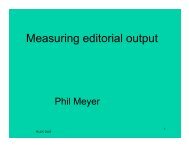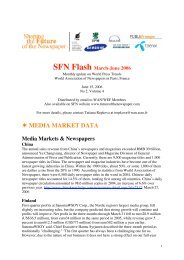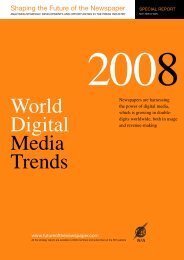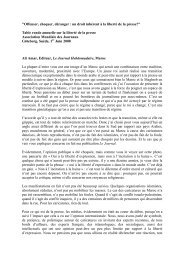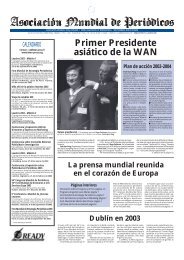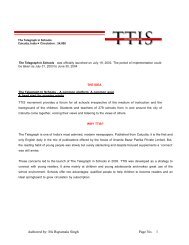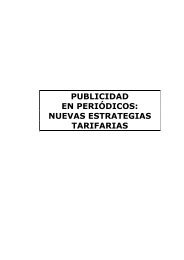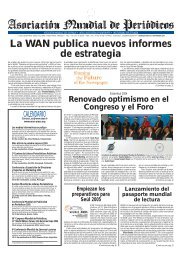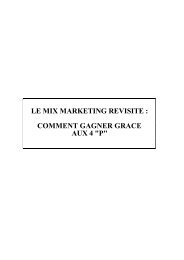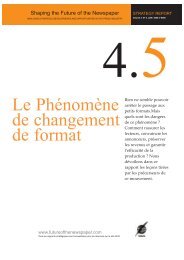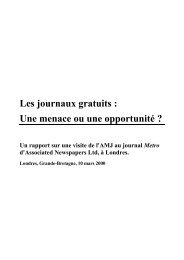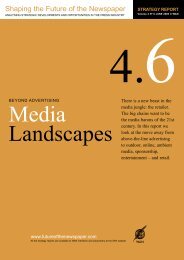WORLD PRESS TRENDS - World Association of Newspapers
WORLD PRESS TRENDS - World Association of Newspapers
WORLD PRESS TRENDS - World Association of Newspapers
You also want an ePaper? Increase the reach of your titles
YUMPU automatically turns print PDFs into web optimized ePapers that Google loves.
IRELAND<br />
Commentary – Cullen Communications<br />
The Irish economy is heading for a second year <strong>of</strong> weak growth<br />
as it awaits the long-delayed global economic recovery to get<br />
things moving again.<br />
Last year, sluggish personal spending, weak exports and a fall<br />
in business investment were partly <strong>of</strong>fset by an 8% rise in<br />
government consumption in what was an election year.<br />
However, after winning the general election in May, the twoparty<br />
coalition moved at once to rein in public spending, which<br />
was rising at a totally unsustainable 20% a year.<br />
Last December’s Budget then imposed around €1 billion in new<br />
taxes, mostly in indirect taxes such as VAT and duties on drink<br />
and tobacco. There is also an estimated €500 million in higher<br />
fees and charges for public services. Current government<br />
spending is targeted to grow by only 8%, so fiscal policy is<br />
contractionary this year.<br />
Consumer spending growth has declined steadily since the 2001<br />
peaks and is estimated to have grown by 2.5% in 2002. It<br />
appeared to be still slowing in the early months <strong>of</strong> 2003 and 3%<br />
growth is probably the best that can be expected. The remarkable<br />
Irish export engine also stalled, as production from the many<br />
ICT (information and communications technology) plants in<br />
Ireland fell by up to 30%. The only growth was in high-value<br />
exports from the pharmaceuticals industry, which makes many<br />
<strong>of</strong> the world’s best-selling drugs in Ireland. Were it not for this,<br />
exports would be down 6%.<br />
It is unlikely that export growth will recover until there is a<br />
sustained pick-up in the world economy, especially in Europe.<br />
It may be well into 2004, at best, before Ireland sees a noticeable<br />
improvement in trade and investment. For 2003, export growth<br />
is expected to be less than 4%.<br />
A new national pay agreement has been negotiated which gives<br />
rises <strong>of</strong> 7.5% over the next 18 months. However, in the private<br />
sector, shorter hours and smaller bonuses have cut into actual<br />
earnings. Some firms may be unwilling to pay the national<br />
terms. The impact <strong>of</strong> indirect tax rises mean inflation will stay<br />
close to 5% for much <strong>of</strong> this year, so most private sector workers’<br />
incomes may barely keep pace with inflation. Pubic sector<br />
workers will do much better, with payment <strong>of</strong> a relativity award<br />
totalling 9% on top <strong>of</strong> the national deal. The cost <strong>of</strong> this means<br />
other government spending will remain tightly constrained.<br />
The overall economy, measured by gross national product<br />
(GNP) may grow by less than 3% in 2003, following an estimated<br />
2% in 2002. There is some debate whether this means<br />
employment will fall in 2003, for the first time in almost 20 years.<br />
Even if it does not, unemployment is expected to rise to 5%.<br />
This relatively low rate shows that the 1990s boom left Ireland<br />
scope to withstand a couple <strong>of</strong> slow years, but it needs global<br />
recovery next year.<br />
Circulation<br />
Overall circulation figures for national daily newspapers in 2002<br />
are up on 2001 by 0.6%. Morning newspaper sales grew by 0.7%<br />
and sales <strong>of</strong> evening papers increased by 0.08%.<br />
Sunday newspaper sales increased by 5%.<br />
Ireland On Sunday joined the National <strong>Newspapers</strong> <strong>of</strong> Ireland<br />
in January 2002, bringing NNI members up to twelve.<br />
Advertising<br />
Newspaper advertising revenue generated €254 million for the<br />
year 2002. Spend in daily and Sunday titles contracted by 9%<br />
on 2001. However, advertising expenditure improved in the 2 nd<br />
half <strong>of</strong> 2002 and was only down 5.9% with the 4 th quarter only<br />
down 3.7% on the corresponding period the year before.<br />
Display advertising accounted for 55.5% <strong>of</strong> overall revenue<br />
(€254million).<br />
Classified advertising accounted for 44.5% <strong>of</strong> overall revenue<br />
(€254million).<br />
VAT<br />
The Irish Government announced in December 2002 that the<br />
VAT rate on newspapers would increase by 1% to 13.5% from<br />
1 st January 2003.<br />
Changes in Ownership<br />
Examiner Publications bought the Sunday newspaper, The<br />
Sunday Business Post from the UK publisher, Trinity Mirror. On<br />
a national scale, Examiner Publications now own the Irish<br />
Examiner, the Evening Echo and The Sunday Business Post.<br />
2002 saw the establishment <strong>of</strong> a new mid-market tabloid aimed<br />
at Dublin. Called the Dublin Daily News, the title places a strong<br />
emphasis on lifestyle and marketing towards the young, brand<br />
conscious readers. It went on sale in March 2003.<br />
Independent <strong>Newspapers</strong> separated the Saturday edition <strong>of</strong> the<br />
Evening Herald from the Monday to Friday editions and called<br />
it the Weekend Herald. Current circulation figures (ABC July to<br />
Dec 02) show sales at 67,233. Weekday sales for the same period<br />
stand at 104,137.<br />
Environment<br />
An Environmental Working Party was established by the<br />
newspaper and newspaper distribution industries in the<br />
Republic <strong>of</strong> Ireland. The purpose <strong>of</strong> this party is to find workable<br />
solutions to divert newspaper and magazines from landfill.<br />
Work is ongoing.<br />
Copyright<br />
Newspaper Licensing Ireland Limited (NLI) was established in<br />
2002 for the purpose <strong>of</strong> licensing companies who photocopy<br />
and/or scan sections or cuttings from the member titles <strong>of</strong> the<br />
National <strong>Newspapers</strong> <strong>of</strong> Ireland (NNI). Companies who<br />
photocopy and/or scan sections or cuttings from NNI titles<br />
without a licence will be deemed to infringe the Copyright and<br />
Related Rights Act 2000.<br />
<strong>WORLD</strong> ASSOCIATION OF NEWSPAPERS - <strong>WORLD</strong> <strong>PRESS</strong> <strong>TRENDS</strong> 2003 147



